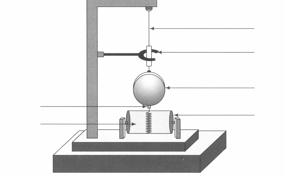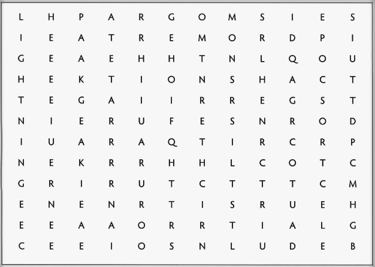Earthquakes
Important Questions on Earthquakes
Label the different parts of seismograph shown below.

What is the Richter scale?
What do you understand by the term 'earth's plates'?
The terms that you came across in the chapter 'Some natural phenomena' are hidden in the alphabet grid given below. Try to find out all of these terms by going up, down, or even diagonally forward as well as backward.

Define the term 'crust'.
Match the items in Column A with the items in Column B.
| Column A | Column B |
| 1. Seismograph | a. An electric spark on a huge scale in the sky |
| 2. Richter scale | b. Transfer of electric charge from a charged object to the earth |
| 3. Seismic zones | c. Passage of electric current in the air due to movement of charges |
| 4. Earthquake | d. Expresses the intensity of an earthquake |
| 5. Weak zones | e. Detects the presence of electric charge on an object |
| 6. Seismic waves | f. Areas prone to earthquakes |
| 7. Earthing | g. Sudden shaking of the earth |
| 8. Electroscope | h. Boundaries of the earth's plates |
| 9. Discharge | I. Waves generated by an earthquake |
| 10. Lightning | j. Records seismic waves |
Tsunami is a Japanese word which means:
_____ is the place inside the earth's crust where the earthquake originates.
Which of the following can cause tremors on the earth?
The layer of the earth which is fragmented is called:
A major earthquake occurred in India on 8 October, 2005 in:
If you are at home during an earthquake:
The magnitude of an earthquake is measured in decibels.
Earthquakes last for longer duration than thunderstorms.
Name the earthquake-prone areas in India.
Name the Layers of the earth.
Name the following:
Things that can get damaged in an earthquake
Fill in the blanks with the correct options from the box:
[Newton, Benjamin Franklin, Charles F. Richter]
_____ developed the Richter scale in 1935.
Fill in the blanks with the correct options from the box:
[Seismometer, Electric current, Negative, Boundaries, Continual, Charges, Charles F. Richter, Earthing, Fork lightning, Repel, attract]
The plates of the earth are in _____ motion.
Fill in the blank with the correct options given below:
A seismograph is also known as a _____.
[Electric current, Charles F. Richter, Earthing, Seismometer]

